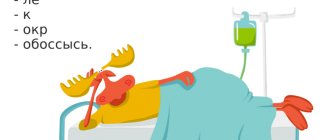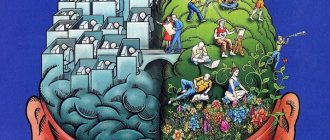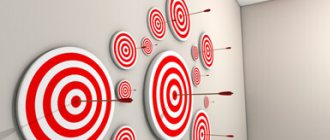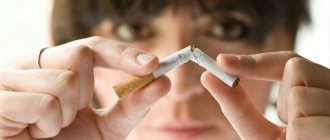Hello dear readers! We continue to move forward in self-development and improving our skills and habits. Lyudmila is in touch and I would like to immediately draw your attention to small nuances. How many of you brush your teeth after every meal? Who washes their hands after going outside? Are there those here who have the habit of smiling at themselves in the mirror every morning? Do you think these are important and useful habits or can you do without them? In this article, we will look at a large list of useful habits for every day and talk about which of them are very important for us, and which ones we can do without. And to make it clearer, I will give examples from life. Go!
What is a habit?
A habit is a repeated form of behavior that does not require volitional effort. If our consciousness reacts positively to a certain action and feels discomfort in its absence, then addiction has begun. The process is accompanied by a physiological reaction - a combination of nerve connections that determine the algorithm of actions.
An addiction is formed after repeated repetition - the brain remembers what to do and goes into an unconscious mode.
Habit is a good way to save internal resources , since the brain “does not turn on.” According to the established scenario, the action occurs much faster than during conscious behavior.
For example, when we return home, the first thing we do is turn on the light in the hallway. But if we move the switch, our hand will not touch it. We don’t think like this: “It’s dark, we need to turn on the light, and to do this we need to find a switch,” but we simply press the button. There are countless such little things in everyday life, and everyone has their own established thousand habits.
Take a character test
Psychologists view all human emotions as habits. Enthusiasm, melancholy, pedantry - we choose all this from ourselves, becoming prisoners of emotion, and then a behavioral formula.
How does the addiction mechanism work?
Researcher I.P. Pavlov claims that a person gets used to absolutely everything. There is a certain vicious circle - we receive an emotion, get used to it, and become captive of it. Emotions experienced once give us a ticket to the risk zone to feel them again. Our consciousness already has a template, knows how to react to such events or circumstances. And the brain, having managed to accept the behavior model, will prevent overcoming the habit through anxiety and internal discomfort.
For example, we were scared of a dog. The brain remembered our reaction and prepared the appropriate formula for it. Now the consciousness is ready to be frightened at the sight of any dog. The dominant principle works - the excited center of the brain stops the work of other nerve connections, so we are unable to quickly get out of depression or overcome fear.
Where do habits come from?
- They are taught in childhood to wash their hands before eating, brush their teeth in the morning, put their shoes in order in the evening, and so on.
- They arise spontaneously during interaction with society - avoid elevators, drink coffee in the morning.
- We form them ourselves - drink warm water on an empty stomach.
Types of habits:
- Professional language teachers automatically correct mistakes they see or hear in their minds.
- Household – wash your hands after using the toilet.
- Social – respond to greetings: “Happy New Year!”
- Individual – take initiative.
Depending on the form of manifestation of the habit, there are:
- Physical – shuffling your feet.
- Emotional - end the conversation with wishes for a good day.
- Behavioral – clean the room according to the usual plan.
All habits are either useful or harmful. The difference between them is that the former are led by us, and the latter are led by us. Bad habits usually find us on their own, but to develop good ones we have to work hard.
Types of habits and their expression
Everyone knows clearly harmful addictions, such as alcoholism, drug addiction, smoking. I'm sure you're wondering how the harmfulness of less "observable" behavioral modifications is determined? To understand the difference between good and bad behavior, let’s look at their types in detail:
- “Fidgeting” while sitting still is a manifestation of general anxiety and an excess of unspent energy. Researchers at the University of Toronto say fidgeting reduces levels of the stress hormone cortisol, which is actually a good thing. But such behavior leads to a decrease in attention, which in general is a negative point for a person. It is also worth remembering social norms of behavior. If a fidgeting person makes a lot of noise, it can distract and irritate others and interfere with the work process.
- “Nail biting” is not harmful to health if they are clean. But this is a completely ugly activity. Typically, this behavior is associated with a high level of anxiety.
- “Curling your hair” is often done by women with long hair. Many ladies try to attract the attention of men in this way. The habit also belongs to the category of nervous ones, that is, signaling anxiety.
- “Snacking” - eating food between main meals, refers to a subtype of eating habits. This is considered harmful if the snacks are classic - carbohydrate and fatty, and not fresh fruits and vegetables. Foods that contain a lot of carbohydrates and fats have the ability to lift your mood. It does this by producing neurotransmitters that can relieve stress and even physical pain. The effect is temporary, and the consequences are heaviness, despondency, excess weight.
- The habits of poverty haunt a person who has gone through a harsh school of life, even after improving his material well-being. Without getting rid of them, a “beggar” who has become rich is unlikely to remain prosperous for a long time. The manners of the poor are acquired as a way of dealing with fear. By the way, I recommend that you read the article on the blog: “Can anyone become financially independent and what is required for this.”
Why do you need to form good habits?
We are improving.
Harmful activities steal our time, money, emotions, while useful ones help us achieve our goals and improve our efficiency. To feel good, confident and energetic, you need to get used to useful actions.
We stop forcing ourselves.
Willpower is an effective way to force yourself to do something, but it requires effort. Every time we force ourselves to take some action, we unconsciously become upset and lose enthusiasm. But if the action is turned into a habitual thing, we will soon cross it off the list of “forced actions”.
The good triumphs over the bad.
It’s difficult to just stop eating at night - all your thoughts will be about the food in the refrigerator. And if you make a substitution, for example, drinking a cup of green tea with lemon before bed, then the ritual of filling the stomach will remain, but its meaning will change.
Take the self-esteem test
Why is it scary to have habits of poverty?
I propose to look at the habits of poverty in more detail, since many do not understand why some people are rich and others are not. It's all about manners and behavior. Therefore, I decided to pay more attention to this particular point.
The habits of poverty are manifested in the following
- Buying cheap food does not necessarily mean purchasing gourmet delights. It is important to buy good quality products and things. Poverty teaches you to take “the cheapest thing you can get and have a longer shelf life.”
- Irrational behavior is to spend all the “extra” money instead of creating an emergency fund.
- Giving gifts - if there is not enough money for something worthwhile, they give a souvenir from “everything for 5”. But when a person with a beggarly mentality has money, he spends it very quickly and does not realize that he does not need to buy gifts for his child every day.
- Fear and automaticity of counting expenses - implies a constant calculation of the total cost of products in the basket, utility costs and other payments for which there may not be enough money.
- Irrational refusal to buy basic necessities. If a person with a poor mindset gets into a summer sale of good winter jackets, he will not buy himself a great jacket. Because “we still have to live until winter.”
This list can go on indefinitely, constantly being updated with new variations of addictive behavior. All of these manifestations are related to the nervous system and, to varying degrees, can release dopamine, a reward chemical for the brain.
How to develop good habits?
Define the goal.
To get used to something, especially good things, you need to make an effort. When there is a clear understanding of what I am doing and why, the process will go smoothly. For example, the goal is to improve the condition of the skin, saving on a cosmetologist. To achieve this, you need to regularly massage your face, use special products, and get more rest. Thoughts about the upcoming photo shoot in a new image will give you strength.
Start simple.
You cannot become an adherent of a healthy lifestyle in one day, but you can in a month. If we decide to start a new life on Monday, we will remain in the same place for a very long time.
If we gradually remove junk food from the table, walk more, sleep longer, we will develop a whole range of good actions. The main thing is to take small steps to harmoniously and firmly consolidate new formulas.
How long does it take and how is it formed?
Any action over a certain period of time can be brought to automaticity. You just need to repeat it often. It is advisable to do this at regular intervals. Scientists say that habit formation occurs in 21 days.
But do not forget that 3 weeks is the minimum for which it is possible to secure a newly acquired item. Each person has a different level of perception of what is happening around them, so the time for consolidation will be different.
Answering the question of how many days it takes to develop a new skill, we can confidently say that it will take at least 21 days to automatically complete the task.
Simple skills require less time than those that require maximum concentration and skill. You can learn to drink water every day several times faster than to do physical exercise.
It may take several months to love yourself and learn to lead a healthy lifestyle. Don’t think that this is too long and it’s better to leave everything as it is. You need to persistently and gradually move towards your goal.
Top 10 healthy habits.
- Drink a glass of warm water on an empty stomach. This way you can gently start important processes in the body.
- Make a shopping list. Saving money and time.
- Don't walk down the street with your head in your gadget. There is a risk of injuring yourself or others, or getting into an accident.
- Start the morning with a smile. Having received the joy hormone immediately after sleep, the whole day will be more positive.
- Watch your posture. If you keep your posture straight while walking down the street or standing at home near the stove, you can get rid of slouching.
- Hug your loved ones more often. Hugs are a way to quickly get the joy hormone, strengthen your immune system, relieve tension and feel loved and loving.
- Ventilate the room before going to bed. Fresh air helps you relax and fall asleep faster. It makes the atmosphere of the room lighter, healthier.
- Relax before bed. According to statistics, 8 out of 10 young people look at gadgets before going to bed. The screen has a hypnotic effect - it’s hard to tear yourself away from it, although your eyes already want to rest and your brain wants to relax.
- Eat healthy food. If a few walnuts, a handful of berries or fresh juice become a “must have for every day”, your well-being will noticeably improve.
- Throw away unnecessary things. Almost everyone has things in the “too bad to throw away, let them sit around for a while” category. Unclaimed shoes, written notebooks, chipped dishes store negative information and litter the house. A great habit is to throw out everything old, unnecessary, and used every week.
You have just learned what a habit is, what its mechanism of action is and how long it takes to form it. Maybe it's worth conducting an experiment to find out if 60 days is enough for you to get used to something useful?
Take a self-confidence test
- Additional Information:
- How to learn to joke - 10 tips
- How to become brave - 9 effective tips
- How to find out everything about a person and what ways are there?
- How to understand a person - psychological life hacks
- How to become funny - 9 secrets
- What is frank conversation and what are its rules?
- What is a sense of humor and why is it important?
- How to develop a sense of humor - 7 tips
- How to get rid of bad habits once and for all?
Acquired behavior
From performing the same actions over and over again, a certain program is recorded in a person’s mind, which is “launched” when the appropriate situation arises. Simply put, people form habits through repeated repetition of certain techniques. It is this psychological phenomenon that will be discussed later in the article.
Below you can find out what habits are, how they are acquired and whether it is possible to get rid of them. And further it will be described in detail how to begin to change your life for the better by developing positive skills.
Relevant products in the Online store:
Korres
Sun Protection Emulsion with Yogurt SPF20
799 rub.
REN Clean Skincare
V-CENSE Day moisturizing face cream against the first signs of skin aging
from 4,664 rub.
exclusive online only
Clinique
Corrective cream against signs of fatigue on the face and the first signs of skin aging SPF25 - for dry and combination skin in travel format
from 2,655 rub.
Clinique
Corrective cream against signs of fatigue on the face and the first signs of skin aging SPF25 - for dry and combination skin
from 4,170 rub.
All goods
Adverse habits
The most dangerous habits are:
- smoking;
- gluttony;
- alcoholism;
- obsession with toxic substances, drugs, pills;
- gambling addiction.
Such habits can kill a person. They quickly develop into an addiction and a disease that needs to be treated in hospitals under the supervision of professional doctors.
These problems may appear due to a weakened mental state or problems with the nervous system.
Among the indecent habits are the following:
- nose picking;
- aggression;
- nail biting;
- groundless jealousy;
- constant yawning;
- frequent delays.
They are not as harmful as the previous ones, but nevertheless they spoil relationships between people.
Structure
Strong negative emotions such as stress, depression, fear and discomfort can trigger negative behavior patterns. Therefore, the first element of the structure is an emotional trigger or a strong emotion: enthusiasm, stress, depression.
The second element in the structure is a behavior pattern, or habit itself. The third component is reward or pleasure.
Repeated repeatedly, this structure is fixed in the human brain and becomes the only possible behavior for a long time. Thanks to this, the personality can function fully automatically without additional energy expenditure.
Essential skills for life
Useful or correct skills are those that help improve human functioning. For example, leading a healthy lifestyle, rationally using work hours, giving up seats on public transport to older people are all good habits.
It is worth noting that some of them will be useful from the point of view of society, while others will be useful to the individual. However, many individual behaviors are part of social ones.
Good habits make an individual a better person. A striking example is maintaining an active lifestyle. If a person jogs every day, this will have a positive effect on his health. When he is accustomed to doing his job conscientiously, he increases his authority and makes a meaningful contribution to the development of his enterprise. In general, a good habit is something that helps a person develop and improves his life.
Incentives are everything
Stimulus control techniques have been successfully used in various fields, for example, to treat insomnia.
People suffering from insomnia are instructed to go to the bedroom and go to bed when they feel tired. If after this they cannot fall asleep, they cannot stay in bed - they must go to another room and occupy themselves with something. When they feel sleepy, go back to bed.
After some time, a person begins to associate the bed exclusively with sleep, and not with any other activity. Once people develop this habit, they instantly fall asleep in their bed because they now associate it with sleep.
Another example of omnipotent stimuli is food. The book Mildness Eating contains evidence that shows how small cues from the world around us greatly influence our behavior.
If you take a big spoon, you eat more. If you eat from a large plate, you will eat more. If you place a bowl of candy on the table near you, you will eat twice as much.
Well, everything is clear with incentives, but can you use them to educate yourself and build good habits for yourself? Easily.
The process of habit formation in adults
Adults are able to consciously adjust their habits, unlike children. They are most easily formed through positive emotions associated with a certain action, or when a person is strongly motivated by something.
However, bad habits, surprisingly, are easier to form than good ones. British scientists have found that it takes 66 days to get used to performing an action that will be beneficial. This can be explained by the fact that, as a rule, bad habits cause more pleasure in a person. Wanting to get a dose of pleasant sensations, the psyche and body are rebuilt, and the formation process occurs faster. Therefore, people often break down when trying to quit smoking, start waking up earlier than usual, or run in the morning.











